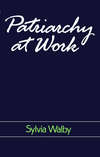Sayfa sayısı 302 sayfa

Kitap hakkında
The concept of 'patriarchy' is one which signals a sharp divide between traditions of feminist thought. Sylvia Walby attempts to conceptualize 'patriarchy' in a way that takes account not only of the complexity of relationships of gender, but also of the subtleties of the interconnections of patriarchy and capitalism. She rejects those accounts which treat patriarchy as a unified set of relations, or which confine the site of patriarchy to any one privileged sphere such as the family. Instead, she elaborates a novel view of patriarchy as a set of 'relatively autonomous relations', the connections between which are spelled out through a variety of detailed case studies. In contrast to many other views of 'capitalist patriarchy', Sylvia Walby characterizes the relationship between capitalism and patriarchy as a relationship, not of harmony and mutual accommodation, but of tension and conflict. This thesis is substantiated through a comparative historical analysis of three contrasting areas of employment: cotton textiles, engineering and clerical work. These analyses show the shortcomings of much conventional literature in sociology, history and economics on women's employment, which pays insufficient attention to the independence of patriarchal relations. The book draws upon sociological, historical, economic and geographic materials to argue for an understanding of gender relations in terms of the specific tensions and compromises between patriarchal and capitalist relations. Exploring the impact of the state on patterns of employment and unemployment completes a book rich in theoretical and empirical analysis. Patriarchy at Work will be recognized as a major contribution to feminist thought and the social sciences.


